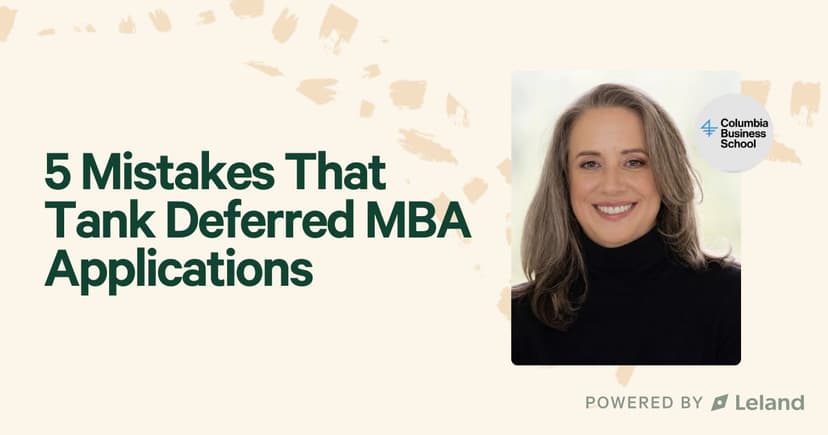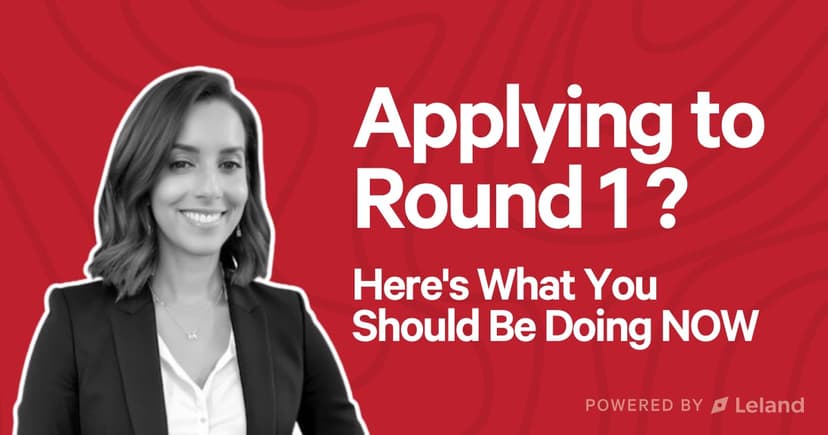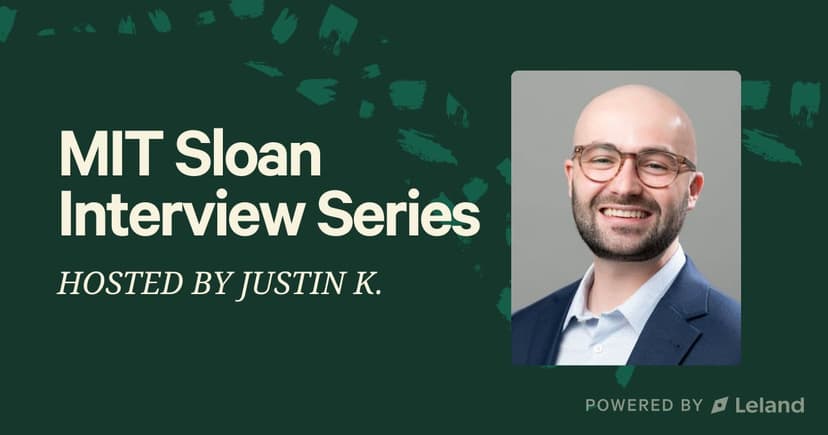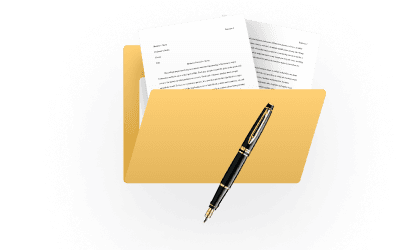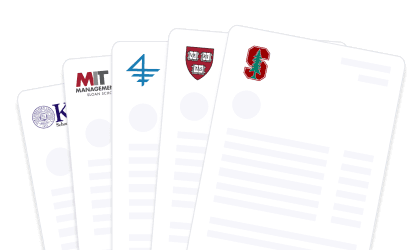Kellogg MBA Letters of Recommendation Guide - Questions, Tips, & Examples
This comprehensive guide to Kellogg MBA letters of recommendation provides valuable insights, expert tips, and real-life examples to help you navigate the process with confidence.
Posted June 17, 2025

Join a free event
Learn from top coaches and industry experts in live, interactive sessions you can join for free.
Table of Contents
Northwestern Kellogg is widely recognized as one of the top business schools in the world. As an applicant to their MBA program, you not only need to submit your own impressive application, but you also need to secure strong letters of recommendation. In this comprehensive guide, we will walk you through everything you need to know about Kellogg's letters of recommendation, including the questions asked, expert tips for writing powerful recommendations, and even examples from successful admits. Let's dive in!
Northwestern Kellogg & The Role of Letters of Recommendation
At Kellogg, letters of recommendation are more than just corroborating evidence: they are a window into how you lead, how others experience working with you, and how you grow over time. Kellogg is known for cultivating collaborative, empathetic, and high-impact leaders. Its culture prioritizes teamwork, self-awareness, and values-driven decision-making. The admissions committee reads your letters with this lens. They’re asking: Is this someone others trust and want to follow? Will they elevate their peers inside and outside the classroom?
While many applicants focus heavily on academic metrics or resume achievements, Kellogg takes a holistic approach. Your letters are critical for surfacing the intangibles: How do you make decisions under pressure? How do you handle feedback? How do you move through conflict, ambiguity, or team dynamics when the spotlight isn’t on you? A strong recommender doesn’t just praise your work, they reveal your character.
Kellogg specifically asks recommenders to describe the context of your relationship, assess your performance relative to peers, and share one piece of constructive feedback and how you responded to it. This last element – your receptivity to feedback and growth – is especially important. More than most M7 schools, Kellogg places a premium on emotional intelligence, coachability, and your ability to evolve as a leader. The most effective letters show evidence of transformation, and not just excellence.
Finally, consistency matters. Your recommendations should align with the story told across your resume and essays. If your written application emphasizes your role as a cross-functional leader, but your recommender focuses solely on your technical execution, that dissonance can hurt your case. The strongest Kellogg applicants are multi-dimensional and the strongest letters reflect that, offering sharp insight into both performance and presence.
Explore additional Kellogg resources:
- How to Nail Your Kellogg MBA Application Essays
- How to Ace Your Kellogg Video Essay – Overview & Expert Tips
- Kellogg MBA Interview Guide
Kellogg MBA Recommendations (2025)
Criteria
Kellogg’s letters are a key source of qualitative insight into how you lead, grow, and operate within teams. The admissions committee uses these letters to assess your interpersonal skills, leadership potential, and how others experience working with you. They’re not looking for generic praise or recycled corporate speak. They’re looking for grounded, specific stories that show you in action: navigating tension, growing from feedback, building bridges, and delivering outcomes through others. See the official site here.
You are required to submit two recommendations:
- One from a current supervisor or manager – this is strongly preferred, as it demonstrates transparency and gives the AdCom confidence in your employer relationship.
- The second should come from someone who can speak credibly to your professional performance and leadership trajectory – this could be a former supervisor, previous employer, client, or senior peer.
Kellogg does not encourage additional letters. The two you submit must carry real weight. This means choosing recommenders who:
- Have worked closely with you (ideally for 6+ months)
- Can speak to both your accomplishments and your growth areas
- Are enthusiastic about your MBA journey and will write thoughtfully
- Have observed you navigating complex interpersonal or strategic dynamics
Questions
Kellogg’s prompts are more behavioral and situational than many peer schools, and that’s intentional. The admissions team is looking for evidence of how you actually lead, not just how you’re perceived. The three questions each test a distinct, high-priority trait:
Question 1: Share an example of how the candidate has engaged with colleagues, clients, or stakeholders who held perspectives different from their own. How did they navigate the situation, and what does this demonstrate about their ability to lead or collaborate in complex environments? (300 words)
- What this reveals: Empathy, emotional intelligence, cross-functional influence, and cultural awareness, all essential in Kellogg’s team-based ecosystem.
Question 2: How does the candidate’s performance compare to those of other well-qualified individuals in similar roles? Please provide specific examples. (300 words)
- What this reveals: Your level of excellence and distinctiveness. This question tests whether you’re a standout, not just strong. Specifics and superlatives matter here.
Question 3: Describe the most important piece of constructive feedback you have given the candidate. Please detail the circumstances and the applicant’s response. (250 words)
- What this reveals: Kellogg deeply values humility, self-awareness, and growth mindset. This question is your recommender’s chance to prove that you’re not just talented, you’re teachable.

Expert Tips for Powerful Kellogg Recommendation Questions
Kellogg’s admissions team reads thousands of recommendations a year. The ones that stand out don’t just check boxes, they reveal depth. They show who you are in motion: in conflict, in collaboration, under feedback, in the real-world crucible of leadership. Below are expert-level tips for maximizing the impact of your letters and ensuring they reinforce the core narrative of your candidacy.
1. Prioritize emotional intelligence and followership over raw output
Kellogg is known for its collaborative, team-based culture. The admissions team is not just asking, “Can you lead?” – they’re asking, “Do people want to be led by you?” The best letters show influence without ego: moments where you brought others in, earned trust across difference, and elevated the people around you.
2. Don’t shy away from vulnerability – Kellogg leans in on growth
That third prompt (about constructive feedback) is a gift. Many recommenders water it down but Kellogg actually wants to see how you’ve responded to challenge or imperfection. Great candidates aren't flawless; they’re coachable. A recommender who shows how you received feedback, internalized it, and evolved is giving Kellogg exactly what it wants: a growth arc.
3. Encourage comparative language and superlatives (but only when earned)
Kellogg’s second prompt directly asks for comparison: How do you stack up? This isn’t the time to be modest. The AdCom is actively benchmarking you against other high performers. Specific, calibrated praise (e.g. “Top 5% of analysts I’ve managed in my 15-year career”) is powerful.
But it must be backed by evidence. Without concrete examples, superlatives lose credibility, so push for both.
Bonus: Provide your recommender with a prep doc
A letter of recommendation prep doc is a concise, thoughtful brief you give to your recommender to help them write a stronger, more tailored letter. It typically includes your MBA goals, key projects you’ve worked on together, traits you hope they’ll highlight, and reminders of specific moments that reflect your leadership and growth. It doesn’t script their response, but it gives them the context they need to write with depth, clarity, and alignment with your overall application. Strong prep = stronger letters. Download a free template and email below.
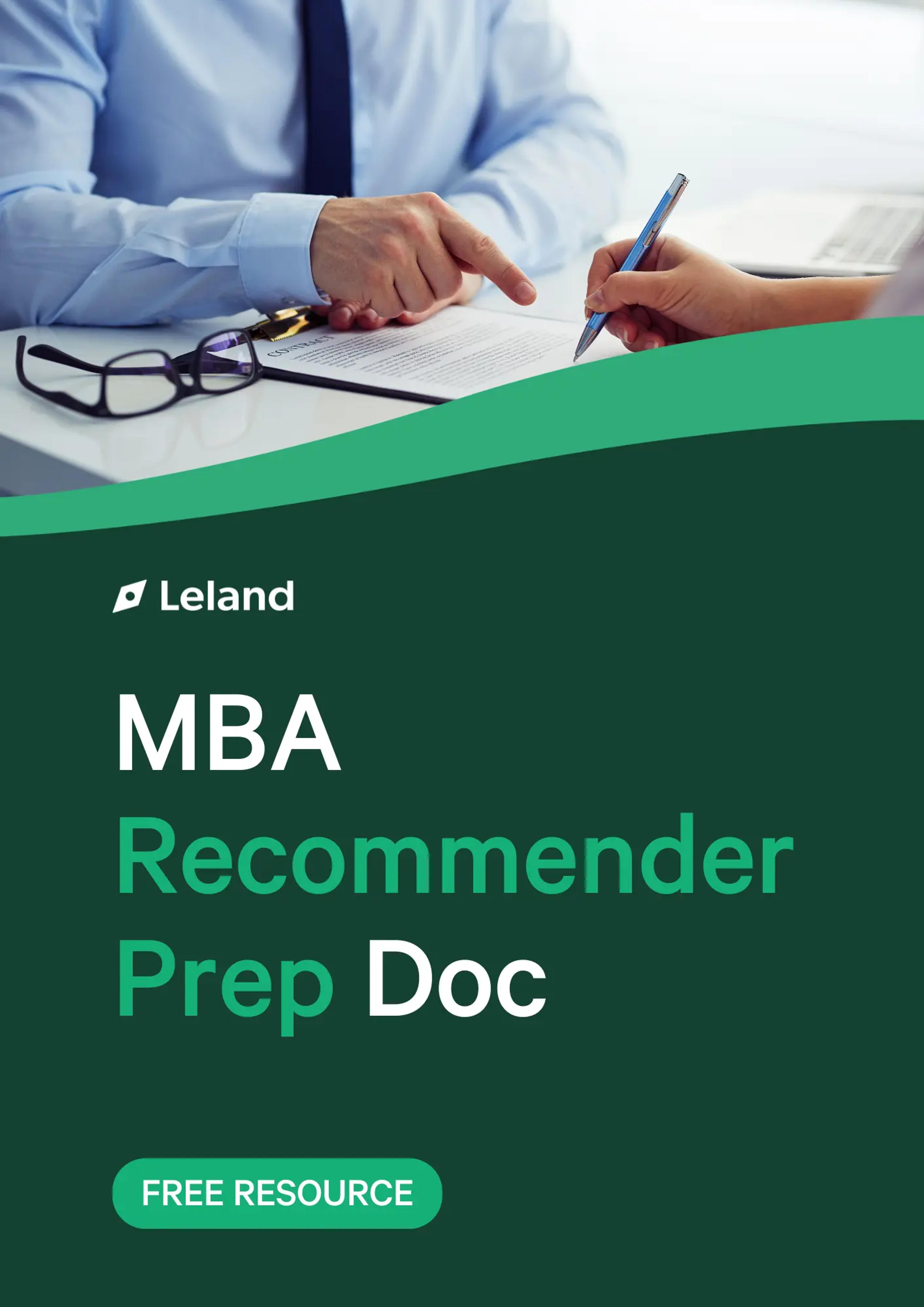
MBA Recommender Prep Doc (Template & Example)
Help your recommender write the strongest possible letters with this prep doc, used by thousands of applicants. Download for free.
For Kellogg-specific help on your applications, check out these Kellogg MBA experts:
- William K.: Kellogg MBA & Former Director of Admissions, Professional MBA Coach, 30+ Years of Experience
- Alex R.: Kellogg MBA with AdCom Experience, Former Investment Banker Turned PE Investor
- Nakul K.: Kellogg MBA and Former Admissions Committee Reader/Interviewer, Ex-Facebook, Uber, and Google
Example Kellogg MBA Recommendation
- Recommender Title: Engagement Manager
- Company: [Company] Consulting Group
- Relationship to Applicant: Direct manager for 18 months
Question 1: Share an example of how the candidate has engaged with colleagues, clients, or stakeholders who held perspectives different from their own. How did they navigate the situation, and what does this demonstrate about their ability to lead or collaborate in complex environments? (300 words)
In early 20XX, [Name] led a cross-functional team on a digital transformation project for a Fortune 500 manufacturing client. One of the main challenges was a sharp misalignment between the client’s IT leadership, who wanted to migrate aggressively to the cloud, and their operations team, who feared disruption to plant-level workflows. Tensions were high, both sides were entrenched and previous consultants had failed to get traction.
[Name] approached this deadlock with patience and empathy. Rather than pushing a top-down solution, he led a series of “listening sprints” – small group sessions where each stakeholder group shared its priorities and pain points. He mapped these into a shared concern matrix and used it to reframe the project not as a tech migration, but as a phased enablement of operational resilience.
This simple but strategic reframing helped disarm resistance. He then facilitated a joint roadmap planning session where both teams contributed to timelines and safeguards. The result? A revised transformation plan that was both more technically sound and far better received by frontline teams.
[Name]’s success here wasn’t about compromise for the sake of it: it was about surfacing the deeper logic behind competing perspectives and designing a solution that honored both. It showed a level of collaborative maturity, systems thinking, and strategic influence that’s rare even in more senior consultants. I have no doubt this ability to listen, synthesize, and lead through complexity will serve him, and his peers, well in the Kellogg classroom.
Question 2: How does the candidate’s performance compare to those of other well-qualified individuals in similar roles? Please provide specific examples. (300 words)
I’ve managed 25+ consultants at [Company] over the last five years. [Name] ranks in the top 5% and not just in terms of results, but in how he achieves them. He has consistently outperformed peers on project delivery, client trust, and internal mentorship.
One of the clearest illustrations of his impact came during a six-month strategic review for a consumer goods client undergoing a corporate divestiture. The scope was ambiguous, the timeline tight, and the politics intense; in short, the kind of project that often derails a new consultant. [Name], who was just 18 months into the firm at the time, stepped up as a de facto engagement lead. He synthesized over 50 interviews, built a bottom-up P&L model for each business unit, and developed a strategic segmentation that became the foundation for the board’s divestiture plan. I’ve seen VPs present less clearly.
What’s more impressive, though, is the loyalty he earns from teams. Analysts routinely request to work with her – not because he’s the easiest, but because he sets a high bar while giving clear guidance, real feedback, and genuine support. On one project, he spent three weekends mentoring a new hire who was struggling with Excel modeling and again, not because he had to, but because he saw his potential and wanted him to succeed.
Compared to others at his level, [Name] brings an unusually well-rounded mix of analytical sharpness, executive presence, and emotional intelligence. He adapts quickly, owns outcomes, and makes everyone around him better. That’s why he was just promoted early to Senior Associate (a distinction only given to the top 10% of his class) and why I fully expect him to rise quickly into firm leadership. He’s more than MBA-ready: I believe he’s already operating at the level Kellogg hopes to develop.
Question 3: Describe the most important piece of constructive feedback you have given the candidate. Please detail the circumstances and the applicant’s response. (250 words)
Early in [Name]’s time at the firm, I gave him feedback that he was doing too much herself. While his analyses were excellent, he sometimes hesitated to delegate, especially under pressure. It came from a good place – he wanted to protect the quality of client work – but it wasn’t scalable. On one project, he rewrote a junior associate’s slide deck the night before a client presentation rather than coaching him to improve it. I sat down with him the next day and told him directly: “You’re operating like the most reliable individual contributor. But your next leap is to lead through others.”
To his credit, [Name] didn’t push back or get defensive. He asked thoughtful follow-up questions, then proactively set a goal to improve. Over the next quarter, I saw a meaningful shift. He began holding weekly working sessions with his junior teammates, giving real-time feedback, and involving them earlier in the process. On our next project, he let go of some control and while it was harder at first, the result was a far more empowered and capable team.
What stood out was how seriously he took the feedback, not just to check a box, but to grow. He’s since told me it was a turning point in how he thought about leadershi[: from “delivering the work” to “developing the people.” I’ve seen few consultants take developmental feedback with that level of humility and follow-through.
The Bottom Line
At Kellogg, your letters of recommendation are not just supporting materials, they’re an essential part of how the admissions committee understands who you are as a leader, teammate, and human being. Great stats and polished essays might earn attention, but great recommendations build conviction.
Your recommenders should bring your leadership to life through specific stories, showing not just what you’ve accomplished, but how you’ve grown, how you relate to others, and why you're ready for the uniquely collaborative environment Kellogg offers. In a pool full of high-achieving professionals, the differentiator is often character and your letters are where that character shines.
Choose wisely. Equip your recommenders. Align your materials. And most importantly, remember that Kellogg is looking for more than competence. They're looking for impact, humility, and heart. Make sure your letters help them see all three.
Ace Your Kellogg Application With the Help of an Expert
The Kellogg MBA is one of the most leadership- and community-driven programs in the world, and their admissions process reflects that. Success isn’t just about having strong stats; it’s about crafting a coherent, compelling narrative that highlights who you are, how you lead, and how you’ll contribute to Kellogg’s uniquely collaborative culture. Don’t leave your recommendation letters, or your admission, to chance. Surround yourself with people who know how to get you across the finish line. See several popular coaches below, browse all here.
Additional resources:
- MBA Recommender Questions and Criteria for the Top 10 Business Schools
- MBA Recommendation Letters: How to Ask, Who to Choose, and What Makes a Great One
- MBA Resume Guide – From an Admissions Consultant (With Examples & Template)
- How to Write the Best MBA Essays – From an Admissions Consultant (With Examples)
Kellogg MBA Recommendations – FAQs
Who are the best recommenders for Kellogg MBA?
- The best recommenders for Kellogg MBA are current or recent supervisors who have worked closely with you and can provide detailed examples of your leadership, collaboration, and growth. Kellogg values authentic, firsthand insight over seniority – choose someone who knows you well and supports your MBA goals.
How many recommendations do you need for Kellogg MBA?
- Kellogg requires two letters of recommendation. One should be from a current supervisor if possible, and the other from someone who can evaluate your professional performance and leadership potential, such as a former manager, client, or peer in a senior role.
Is an MBA at Kellogg worth it?
- Yes, but it depends on your personal situation. An MBA from Kellogg is highly valuable, especially for candidates seeking careers in consulting, marketing, entrepreneurship, or general management. Kellogg offers a world-class network, team-based culture, and strong post-MBA outcomes, with graduates earning competitive salaries and landing top roles globally.




